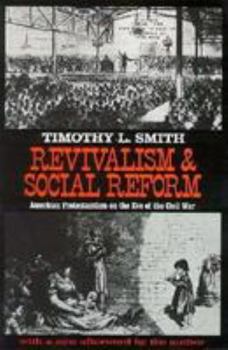Revivalism and Social Reform: American Protestantism on the Eve of the Civil War
Select Format
Select Condition 
Book Overview
This is an important work, which should be read by anyone who is trying to understand nineteenth-century America. It will be of especial interest to students of church history, intellectual history,... This description may be from another edition of this product.
Format:Paperback
Language:English
ISBN:080182477X
ISBN13:9780801824777
Release Date:September 1980
Publisher:Johns Hopkins University Press
Length:272 Pages
Weight:1.01 lbs.
Dimensions:0.6" x 5.3" x 8.0"
Customer Reviews
3 ratings
A classic -- and still one of the best.
Published by Thriftbooks.com User , 15 years ago
"Revivalism and Social Reform" first appeared in print in 1957 and was then out of print for many years. It is good to see it back. Smith, who also wrote extensively on the Holiness Movement of the nineteenth century, dug deeply into an enormous mass of antebellum religious periodicals, tracts and books, much of it ephemeral in nature and often ignored by religious historians of the first half of the twentieth century. The more common approach of historians of that era was to focus on denominational history and "serious" theology. Smith's research, though, exhumed the long-ignored religious enthusiasms of the decades just prior to the Civil War, usually expressed in literature "for he who runs" rather than in weighty tomes. His task was to connect this often-ignored material to American politics and popular culture. Smith wanted us to understand how Protestant evangelical Christianity of the late antebellum period impacted society. His conclusion was that, on the whole, this religiosity was fairly radical in nature: it sought, at the least, to ameliorate festering evils. At its fullest extent it sought nothing less than to begin the millennium in the United States through total social transformation. This crusading Christianity had, by our own standards, its quirks -- such as eliminating the Sunday mail. But, it also tackled such evils as intemperance, urban poverty and, most especially, slavery. (This book should, in fact, be read along with another classic, Gilbert Barnes, "The Anti-Slavery Impulse.") The favored method of evangelical attack was, more often than not, the revivals -- largely urban in nature and, often, national in scope (such as the Revival of 1858). Not all reform efforts were directed at patent injustices such as slavery. Much evangelical energy was expended in domestic missions, the Sunday School movement and like causes. These won't resonate today the way they once did -- but they were terribly important to countless Christians "back them" who donated their hard-earned pennies and nickles to evangelize their fellow citizens. Smith wrote at a time when many -- perhaps most -- historians dismissed evangelical Christianity as the faith of the Unwashed. (Hofstader was especially dismissive.) Smith's work was a useful antidote to this sort of historiographical condescension. The antebellum evangelical movement was, by and large, as socially disruptive in its time as its modern counterpart (e.g. Moral Majority)was conservative in ours. And, its moral highpoint -- a very high one indeed!-- was doubtless anti-slavery. There has been a lot of good historiography about antebellum religion since 1957. But, Smith's book, even as long in the tooth as it may be, is still not a bad starting point for the student of religion and culture in America.
Excellent Study of Religion in pre-Civil War America
Published by Thriftbooks.com User , 19 years ago
In this scholarly yet readable survey, Dr. Timothy L. Smith does a great service to the study of American religious history. Especially notable are the connections he draws between revivalism and the social reform movements, such as temperance & abolitionism, which led up to the Civil War. Highly recommended for anyone interested in American history, especially the history of religion as it relates to society in America.
A Sympathetic Approach to Antebellum Reform
Published by Thriftbooks.com User , 24 years ago
In this work, Smith demonstrated how a sympathetic approach to the revivalists and reformers can yield different conclusions from social control historians like C. S. Griffin or Charles Foster. In antebellum revivalism, Smith discovered little that religious elites could control or exploit, but rather saw the reform impulse as a constructive Christian response to the problems of the age. Furthermore, he virtually rejected Turner's frontier thesis as applied to church history, believing that late-antebellum revivalism and reform were urban phenomena stimulated in part by events across the Atlantic. Finally, Smith emphasized the importance of widely-held theological ideas as sources of social behavior. His work is an important contribution to the social organization approach to antebellum reform, but like the work of many church historians, it has not received its fair share of attention from other scholars. I highly recommend this work for students of antebellum religion and reform. My main criticism is that it dismissed too quickly the theological influence of Calvinism in reform thought. For an interesting counterpoint, see Leo Hirrel's Children of Wrath.





